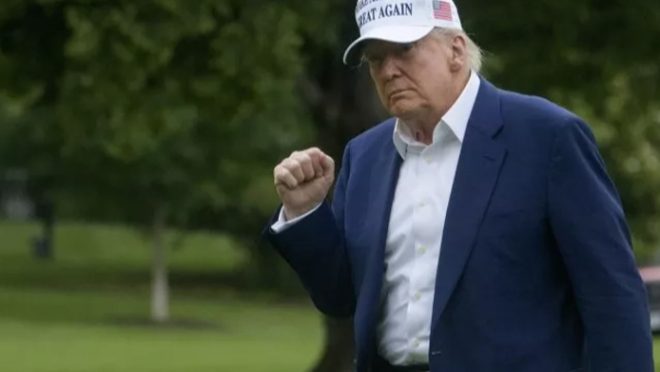Donald Trump halts all new student visa interviews
Donald Trump halts all new student visa interviews

The Trump administration has implemented a halt on all new student visa interviews at U.S. embassies and consulates as it considers a policy to mandate social media screening for foreign applicants, officials confirmed to the Associated Press.
A cable dated Tuesday, signed by Secretary of State Marco Rubio, outlines upcoming changes to the vetting process. One proposal under consideration would require all international students applying to U.S. schools to undergo social media background checks.
“We’ve previously stated that students do not pose a national security risk. Framing them this way is misleading, as they make up only about 6% of total U.S. enrollment,” said Fanta Aw, executive director and CEO of NAFSA: Association of International Educators, in an interview with Newsweek.
Newsweek reached out to both the State Department and the Department of Homeland Security (DHS) for further comment.
Why It Matters
Halting this visa category—which saw over 400,000 issuances in fiscal year 2024—marks a significant development in the Trump administration’s immigration policy. It could substantially slow the international student application process and reduce funding for institutions that depend on them.
What to Know
The State Department cable reads: “Effective immediately, in preparation for broader mandatory social media vetting, consular offices must not add new appointment slots for student or exchange visitor (F, M, and J) visas until further instructions are issued via separate communication.”
USCIS began plans in early March to enhance immigrant social media screening, citing national security reasons.
Applicants for green cards or U.S. citizenship from within the country are already required to provide social media details. Expanding this to those seeking to immigrate would impact about 2.5 million individuals annually.
The State Department’s role includes assessing visa eligibility during embassy or consular interviews. Temporary halts like this often occur when new policies are being introduced, but this action follows months of heightened scrutiny of international students.
Authorities have moved to revoke visas of students currently studying in the U.S., particularly those allegedly tied to pro-Palestinian demonstrations on campuses. Rubio has argued that some of these protests were pro-Hamas and against U.S. foreign policy.
Recently, the administration attempted to strip Harvard of its right to enroll international students—a move that faced legal pushback and was paused. President Trump later demanded a list of all foreign students at Harvard, criticizing that many of their countries do not contribute financially to their U.S. education.
Public Reaction
At a Tuesday briefing, State Department spokesperson Tammy Bruce emphasized that the U.S. will continue to use all available tools to assess visa applicants: “That includes students and other categories.”
Fanta Aw told Newsweek that NAFSA would urge Congress to demand more transparency and warn of the likely impacts on the upcoming academic term.
Aaron Reichlin-Melnick of the American Immigration Council wrote on X (formerly Twitter) that halting student visa interviews could jeopardize approximately $44 billion in economic activity and over 370,000 jobs, citing NAFSA figures. “If the U.S. ceases accepting foreign students, the economic fallout could be severe,” he said.
Homeland Security Secretary Kristi Noem stated last week in regard to the Harvard case: “Allowing universities to admit international students is a privilege, not a right, especially when those students help bolster large endowments through higher tuition.”
What’s Next
A U.S. official speaking anonymously to the AP clarified that the freeze is intended to be temporary and won’t affect individuals who already have scheduled interviews. However, a prolonged pause could disrupt enrollment for summer and fall semesters and hinder the plans of college, boarding school, and exchange students.
Many universities, which have increasingly relied on international students paying full tuition to balance shrinking federal research funds, could face financial pressure if enrollments decline.
Source: With inputs from Newsweek


